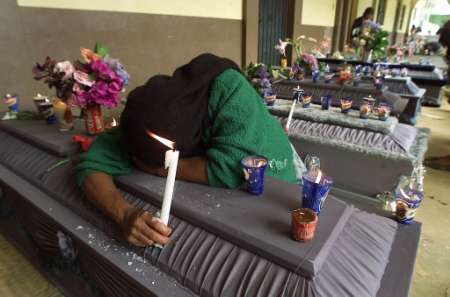

26 Indigenous Peasants Murdered in OaxacaTwenty-six peasants were shot and killed on the night of Friday, June 29th, in an ambush on a remote dirt road in southern Oaxaca, about 200 miles SE of Mexico City. The officials say that the dead were all from a Zapotec Indian community, Santiago Xochiltepec, and that they might have been murdered in a dispute over land rights with a neighboring community. Details of the attack, one of the worst mass killings in recent memory in Mexico, were sketchy. They came from a single source: the truck driver carrying the victims home for the weekend to their village, about a four-hour drive from the state capital, Oaxaca. The driver, Alberto Antonio Pérez, told investigators in the state capital that armed men stopped his truck on a rural road near the town of Agua Fría, about 30 miles southwest of the capital, and ordered him out of the cab. "At that moment they opened fire on the people inside the truck," the state attorney general's office said in a written statement. In this predictable explanation, officials said the people of Santiago Xochiltepec have had a long-running argument with the people of a neighboring village, San Pedro el Alto, over land rights. The villages lie in one of the poorest regions of Mexico, where subsistence farming is the traditional way of life and the only legal living. In rural Mexico, land is held in common by a village or by farmers from neighboring communities. The administration of the land is supposed to be communal, but local political strongmen often hold sway over hundreds of poorer men's fields. Since the gutting of the constitution's Article 27, which protected communal landholdings, indigenous lands have increasing come under attack by land-hungry ranchers or agribusiness firms, what the government cynically terms "land disputes". Disputes over land in these isolated villages can end violently for indigenous and campesinos, in part because those with the resources so easily sway the rule of state and federal law. The governor of Oaxaca, José Murat, said the next day that he was sending 160 state police officers and nearly 30 investigators to the scene of the crime "to carry out the most exhaustive investigation" and to try to arrest the killers. |

So far 17 people have been arrested in connection. Governor Murat said that the majority of those responsible for the massacre had been detained and that justice would be done. Human rights groups are calling these arrests a "witch hunt" consisting only of "arbitrary arrests and violations of human rights." Detained weapons include AK-47's, R-15's, and other military or police carbines. One questions how the peasants arrested would have access to such firepower. Further, the military, once again taking on policing functions, has moved into the municipality of Santo Domingo Teojomulco for an undetermined period. Disturbingly reminiscent of the massacre at Acteal, what it looks like is more scapegoating and militarization under the guise of justice for a ghastly act of violence. El Foro IndígenaEste mayo pasado los grupos indígenas de todas partes del mundo se reunieron en Nueva York para el Foro Permanente sobre los Asuntos Indígenas. El Foro, patrocinado por la Consejo Económica y Social (ECOSOC), parte de la Organización de Naciones Unidas (ONU), duró entre el 13 hasta el 24 de mayo. Encabezado por Ole-Henrik Magga de Noruega, el Foro incluyó miembros de 172 naciones indígenas de Las Américas, Australia, Asia, África y los países europeos, entre otros. Discutieron temas que les afectan, como los derechos humanos, autonomía, acceso a las propias tierras, la perdición de la cultura, la preservación del idioma, la salud, la pobreza y el analfabetismo. El Foro fue creado hace dos años, pese a las objeciones de EEUU y Canadá, pero carece de los fondos para continuar. Por eso los delegados pidieron que la ONU establezca una sede permanente indígena. Kofi Annan asistió al Foro y dio bienvenidos a los delegados. Aunque Annan dijo a los delegados que, "Me gustaría reiterar ese sentimiento, y decir a todos los indígenas del mundo: 'Tienen un hogar en la Naciones Unidas,'" la ONU no ha respondido a la petición. |
||||||||